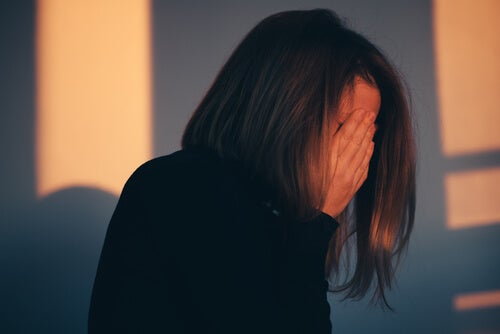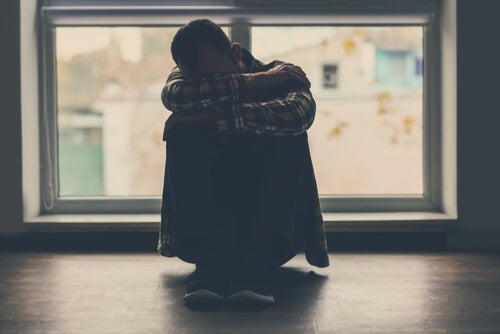The Dobby Effect and Feeling Guilty

Self-punishment is a reality for many people. This is why the “Dobby effect” has become so popular.
If you’re familiar with the Harry Potter books, then the name Dobby will be familiar to you. Dobby is a domestic elf who’s known for injuring himself every time he doesn’t live up to the expectations of his masters.
This character is supposed to be funny. However, his self-harming ways horrify everyone around him. Why would anyone want to hurt themselves?
The Dobby effect is closely related to the way the ever-so-endearing elf treats himself. Feelings of guilt after doing something that goes against your values or that most consider unethical or immoral is normal to a certain extent. You do have a problem, however, when you constantly punish yourself because you feel guilty about everything. This is a problem as you’re putting too much responsibility on your shoulders.
Excess of Guilt

There are many reasons to feel guilty in our society without actually having an actual reason for it. Guilt often arises because we think we don’t meet other people’s expectations or what we believe society expects from us. Here are some examples that will allow you to understand this better:
- Being a bad mother. Many women suffer from postpartum depression. This is a condition that makes them feel extremely guilty. Because, according to literature, being a mother is the best thing that can happen to a woman. Therefore, it should lead to complete, eternal happiness. Thus, in most instances in which this expectation isn’t fulfilled, guilt will manifest.
- You asked for it. Many abused people often justify abuse and violence from their “better” half due to negative actions or attitudes they may have had. Thus, they aren’t able to leave them because they feel guilty. After all, they asked for it, they brought it on to themselves. This is pointed out in the study Self-blame in women battered by their partners. Implied factors.
There are many other scenarios in which a person may suffer from the Dobby effect. For example, the woman who’s going through postpartum depression feeds it by feeling guilty. Likewise, the battered person justifies the abuse they’re suffering from. In fact, it’s a kind of indirect self-flagellation. They’re not hurting themselves, simply allowing someone else to do it.
The Role of Responsibility in the Dobby Effect

Guilt doesn’t have to be expressed in a harmful manner. However, it happens to be so when it becomes the engine of self-punishment with no purpose other than to suffer. A pang of guilt that becomes perverse when it kills your assertiveness by allowing others to harm you. This is what Dobby did.
Sometimes, this responsibility that you put on yourself has been there since your childhood. Perhaps your parents poured all of their frustrations on you. Maybe they told you over and over that you didn’t deserve this or that. Clearly, all this stayed in your mind and, as you grew, you learned to anticipate that “It’s all your fault” or that “You’re a bad person”. Thus, you believe you should be punished for it.
The good news is that, in spite of all this, you can escape the Dobby effect. The best way to do so is by doing things that allow you to improve your self-esteem. Once you improve your self-concept, you can begin to be kinder to yourself and, therefore, more flexible with your mistakes. But, above all, you’ll stop acquiring more responsibility than you should.
Conclusion
If you feel identified with the Dobby effect, don’t hesitate. Consult a professional who may be able to help you.
Not only will your internal dialogue improve, but also the way you treat yourself. This way, you’ll protect yourself against this dangerous phenomena.
All cited sources were thoroughly reviewed by our team to ensure their quality, reliability, currency, and validity. The bibliography of this article was considered reliable and of academic or scientific accuracy.
- Alomo, M., & Muraro, V., & Gurevicz, M., & Castro Tolosa, S., & Lombardi, G. (2016). El sentimiento inconsciente de culpa freudiano: clínica diferencial y suposición de sujeto. Una aproximación metodológica. Anuario de Investigaciones, XXIII , 15-21.
- Ambertín, Marta Gerez. (2009). Culpa, anomia y violencia. Revista Mal Estar e Subjetividade, 9(4), 1077-1102. Recuperado em 01 de abril de 2019, de http://pepsic.bvsalud.org/scielo.php?script=sci_arttext&pid=S1518-61482009000400002&lng=pt&tlng=es.
- Mantilla Espinosa, Fabricio. (2007). El principio general de responsabilidad por culpa del derecho privado colombiano. Revista Opinión Jurídica, 6(11), 131-150. Retrieved April 01, 2019, from http://www.scielo.org.co/scielo.php?script=sci_arttext&pid=S1692-25302007000100008&lng=en&tlng=es.
This text is provided for informational purposes only and does not replace consultation with a professional. If in doubt, consult your specialist.








